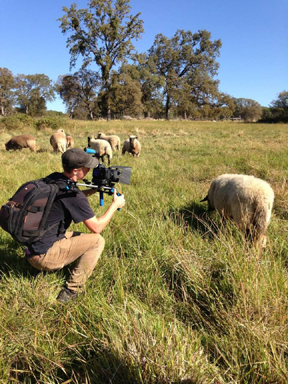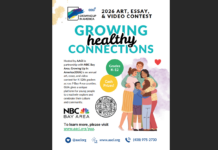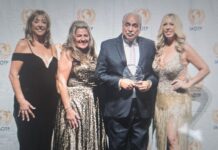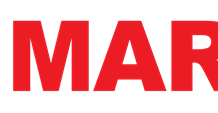
Cowspiracy: The Sustainability Secret is a brazen, entertaining, and sometimes humorous environmental documentary. It is eye opening for even the most knowledgeable environmentalist.
The film follows the fascinating journey of filmmaker Kip Anderson as he confronts what is arguably the most destructive and powerful industry on the planet. On the one hand the film challenges environmental organizations who seem bent on maintaining the status quo, while on the other hand holding meaningful conversations with activists who are not afraid to shed light on the truth.
I am excited to announce that Saratoga Hindu Temple and Santa Clara County Activists for Animals will be hosting a free screening of Cowspiracy on Sunday, September 20 at the Joan Pisani Community Center from noon to 3pm. The event will include a free luncheon generously donated by Plant Based Pizza and Veggie Grill. The screening will conclude with a panel discussion, including among others the co- director of Cowspiracy, Keegan Kuhn.
You won’t want to miss out on the opportunity to see this amazing film and ask the director your questions. I have seen the film a couple of times and have many burning questions myself. That is why I am delighted to have the privilege of interviewing co-director Keegan Kuhn for this article.
Cowspiracy is a very bold and daring film, not only from the fact that you take on the huge, powerful machine that is animal agriculture (and have us feeling nervous for you as a result) but also from the fact that you don’t shy away from confronting the top environmental agencies such as Sierra Club for not taking action. What gave you the strength to confront these agencies as no one has done before?
Keegan Kuhn: My co-director Kip Andersen and I have a strong desire to uncover truths and a determination that sometimes might exceed our own better judgment. The reality is though, that as we did more research and found out just how incredibly destructive animal agriculture is on the planet, we knew we had to do everything we could to raise awareness of the issue.
The fact that many of the large environmental organizations are failing to properly address animal agriculture is just one more piece of this cow, pig, chicken, conspiracy.
This film is very different from any environmental film that I have seen before. It covers so many issues in such an entertaining way and is eye opening even for avid environmentalists. What would you say separates your film from the others?
KK: Unlike other environmental films that focus on one environmental problem, such as fracking or climate change or rainforest destruction, Cowspiracy covers virtually every environmental ill facing the planet because animal agriculture plays a role in all of them.
The destruction caused to the planet by this one single industry is unprecedented. It’s the leading cause of anthropogenic greenhouse gases, rainforest destruction, species extinction, habitat loss, topsoil erosion, ocean dead zones, the list goes on and on.
Because of this broad reaching impact the film has to move quickly to cover many (not all) of the issues effected by livestock production.
I think what also makes Cowspiracy entertaining is that it has a strong narrative following my co-director Kip on the journey of uncovering this secret to sustainability and that there is humor through out the film despite the heavy subject.
I really enjoyed watching Kip’s journey through the film. I could relate to his desire to have a smaller environmental footprint and make a meaningful difference. What did the two of you learn along the way that most surprised you?
KK: What surprised me the most was the impacts that animal agriculture has on the world’s oceans. Raising livestock and their feed crops on land is the leading cause of runoff into fresh water. The runoff from factory farms, feed lots and the massive fields of chemically grown corn and soybeans that are raised for animal feed, ends up filling streams, creeks and rivers with high levels of nitrogen and other fertilizers.
These fertilizers disrupt the natural balance of the oxygen levels in the rivers and ultimately the oceans that they run into. The oxygen devoid water literally suffocates the fish and all aquatic life making them massive dead zones where nothing can live.
For Kip, he found most shocking the impact animal ag has on wildlife. The fact that the U.S. government kills and rounds up wild animals, such as wolves and wild horses because of pressure they receive from cattle ranchers.
One of the most memorable scenes for me was Kip’s visit to the free range beef and pig farm. What is wrong with eating free range animals such as grass fed beef?
KK: There are many issues why grass fed beef is not the solution. The main issue is the amount of land needed to raise grass fed animals vs factory farms. It is vastly more efficient to raise animals in intensive, disgusting and horrifying conditions on feed lots and factory farms than it is to raise them on pasture. A grass fed cow needs 10x-100x more land than her factory farmed sister.
But it goes well beyond that.
Even though wolves in the US are still recovering from almost being extinct, they are systematically hunted and killed because of their perceived threat to “grass fed” livestock. Ranchers, who graze their animals in much of the American west, see all predators as a threat to their business and have insisted that the government keep the populations low. Close to 50 thousand wild horse have been rounded up and taken off of the range because of the pressure “grass-fed” ranchers have put on the government.
Cowspiracy seems very timely in light of the severe drought we are facing in California. How does water used for animal agriculture compare with water used for crops like almonds?
KK: During the drought almonds have been given a lot of attention because of how much water is needed to grow them, but the media at large has failed to talk about the fact that 47% of Californian’s water footprint is made up in meat and dairy products.
Almonds use about 8% of the states water, but alfalfa which is a crop not consumed by humans and fed almost exclusively for livestock, use 15% of the states water! Animal agriculture is the largest consumer of water in California hands down.
Just one hamburger requires up to 660 gallons of water to produce. That’s the equivalent of almost 2 months of showers.
How much water does it take to produce dairy products and why?
KK: It takes around 1000 gallons of water to produce 1 gallon of milk. The reason for this is that cows have to drink 30-40 gallons of water everyday, but also because you have to take into consideration the water used to grow the feed crops that they eat.
The film shows the incredible impact that an individual can have on our planet just by changing her diet. How does eating a plant based diet compare with driving a hybrid car?
KK: Switching your diet from a high consuming animal based diet to a plant-based diet has a greater impact to CO2 emissions than by switching to a hybrid car. The important thing to always remember though is that switching to a plant-based vegan diet effects more than just climate. It benefits fresh water, soils, forests, wildlife and your health. No other lifestyle choice comes close to that.
I have been pleased to see Cowspiracy win an award and enjoy such great success. I enjoyed watching your interview on Democracy Now, and I hear that Leonardo DiCaprio is getting behind the film. What has been the most exciting part about making this documentary?
KK: The most exciting part of making this film has been hearing from so many people around the world how Cowspiracy has affected them. We get emails everyday from people inspired to change their lifestyles for the betterment of the planet and that is very exciting.
We are of course ecstatic about Leonardo DiCaprio being the executive producer of the new edit of Cowspiracy that will be streaming on Netflix around the world starting September 15th 2015.
Cowspiracy brings up almost all the environmental crises we are facing, yet it is not hard to watch because it offers real solutions. I came out with a renewed sense of hope that I can make a real difference. Do you feel that your film is making a difference by empowering individuals?
KK: I believe the film is making an impact. People are waking up to the true power they have every single day to help our planet.
We live in very exciting times and I feel a seismic shift is taking place around the world. We obviously can’t keep living the way we have and I think a peaceful, compassionate and sustainable path is the only road left to us as a species.
Lisa Wade is the host of the documentary screening Cowspiracy on Sept 20th. She lives in Los Gatos and is the mother of two boys. She is an elementary school teacher by profession but has spent the last 16 years homeschooling her two sons. Lisa is also an environmental and animal activist.
She is passionate about volunteering in the community. Her volunteer efforts have included starting and running a home school center in Los Gatos with a group of fellow home school moms. She is also a member of Santa Clara County Activists for Animals where she has been involved in education and outreach.
Lisa Wade






